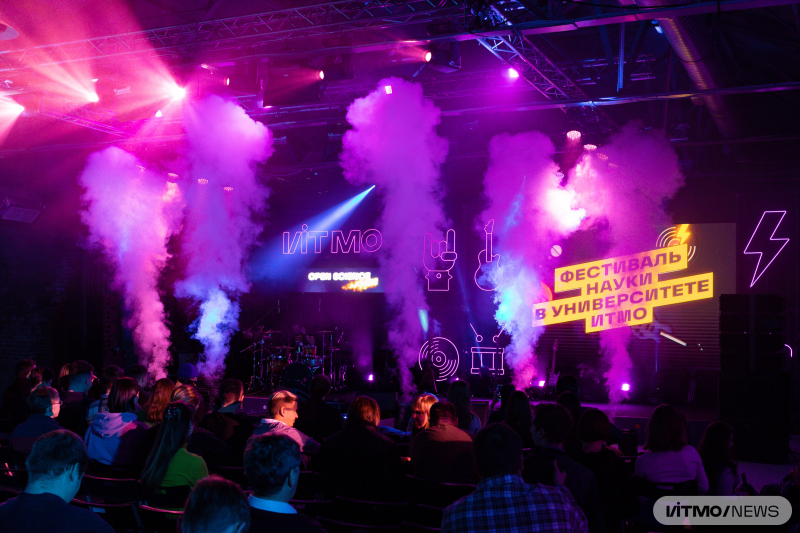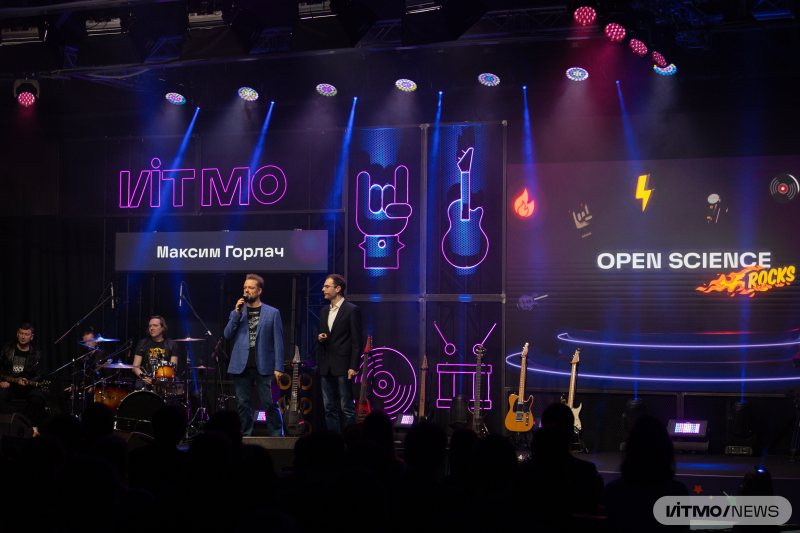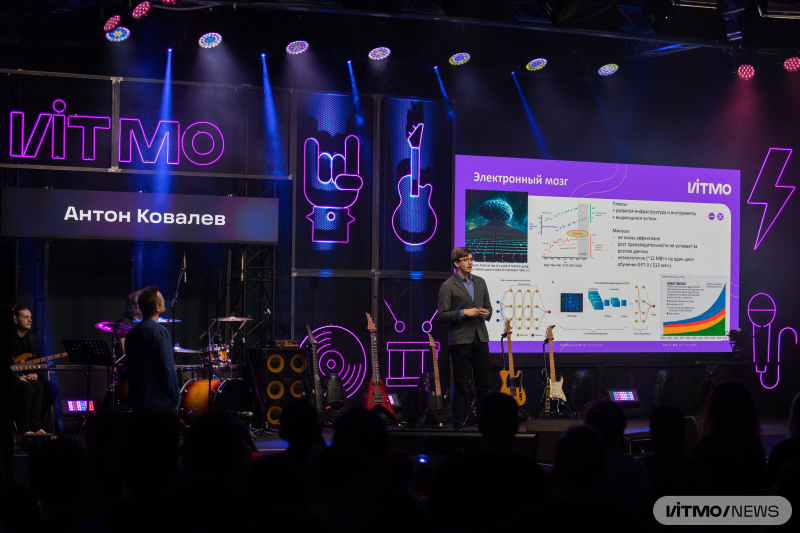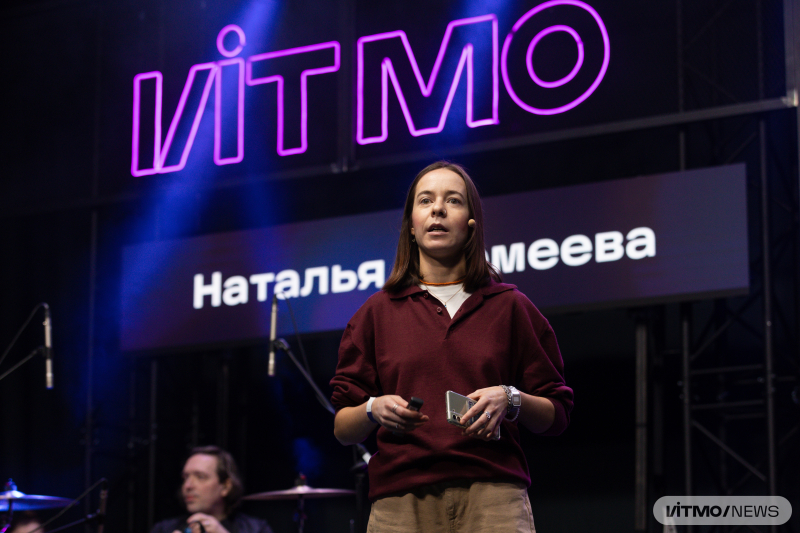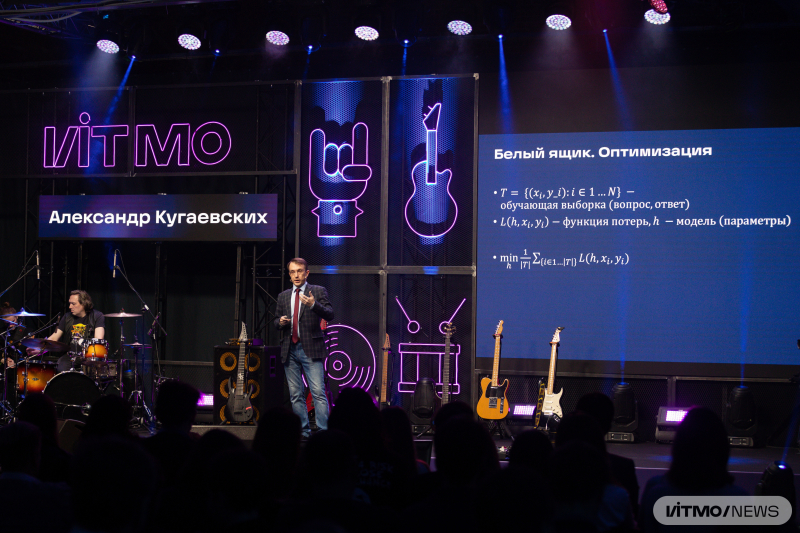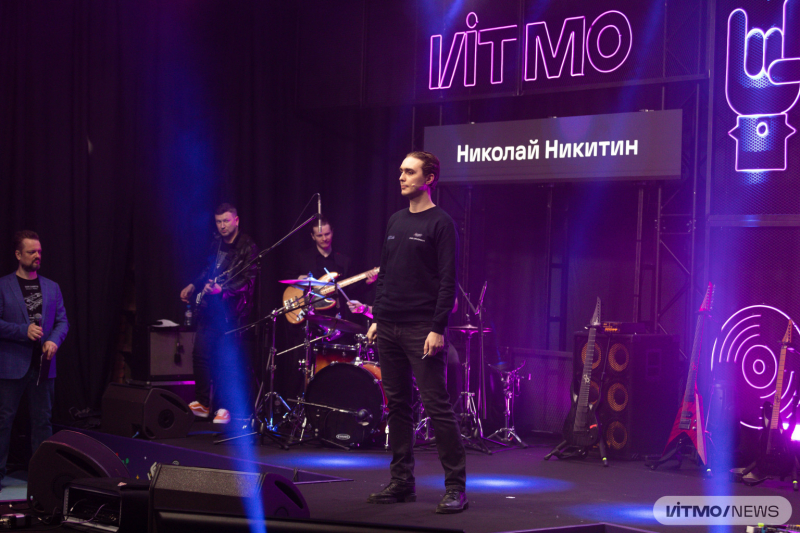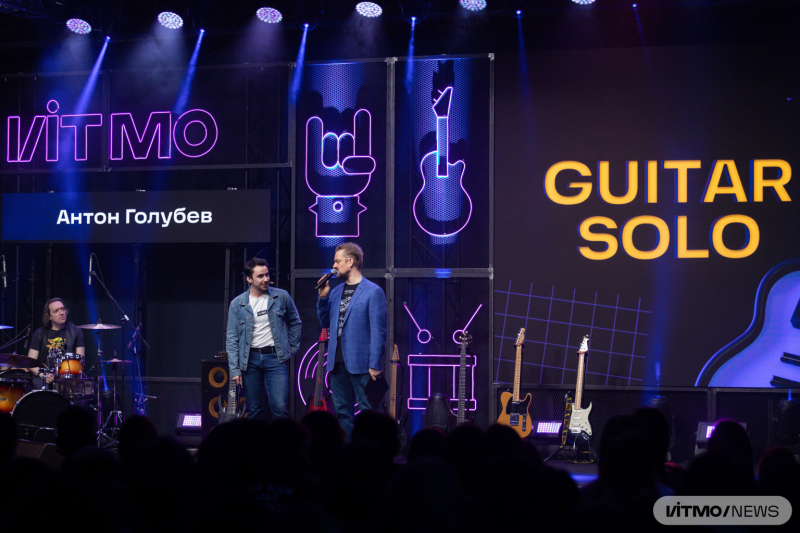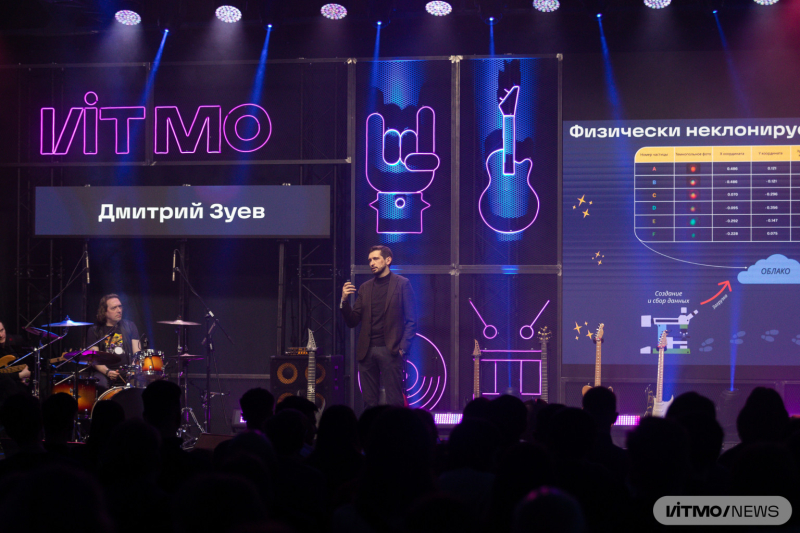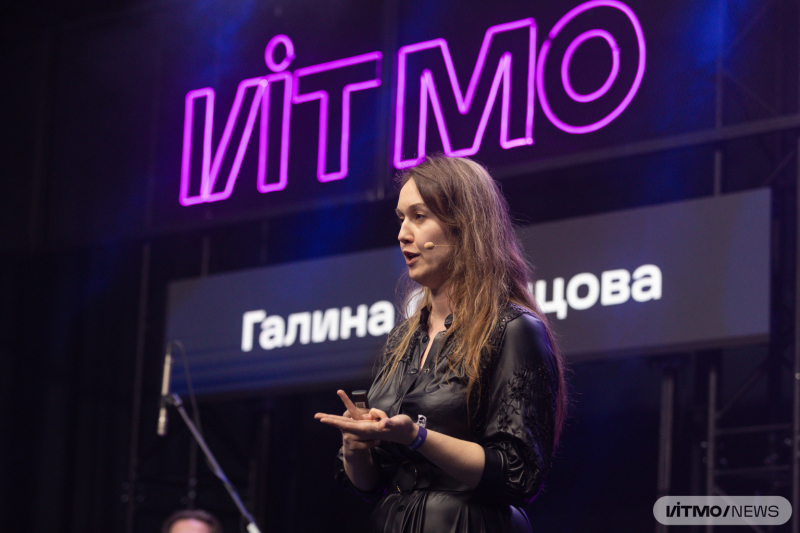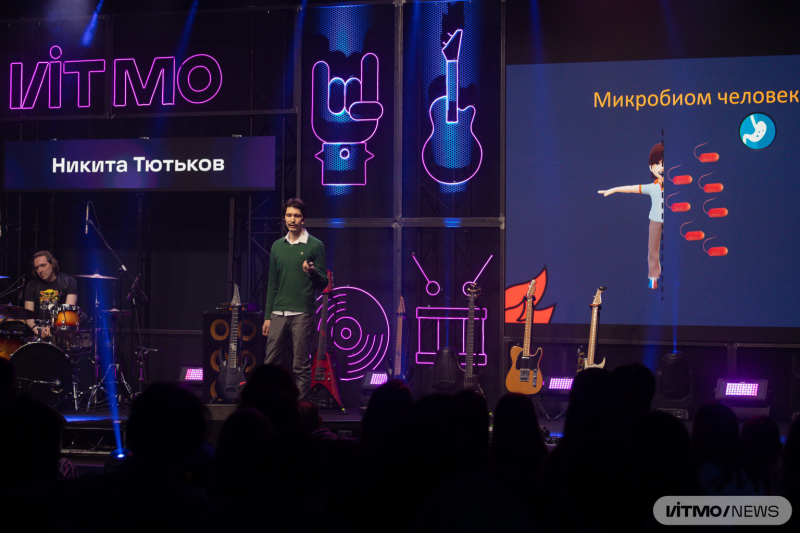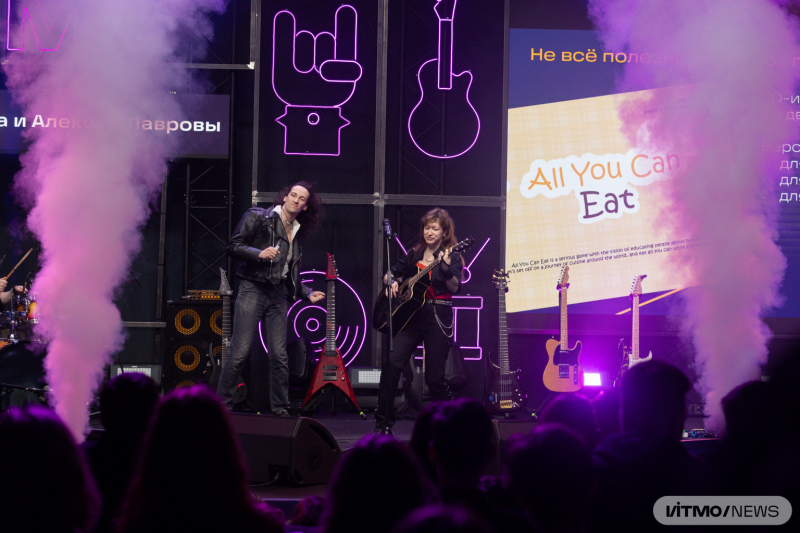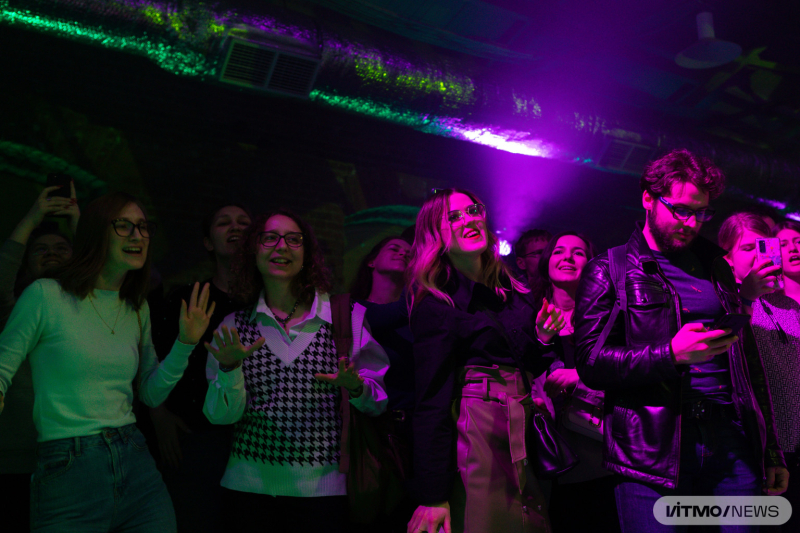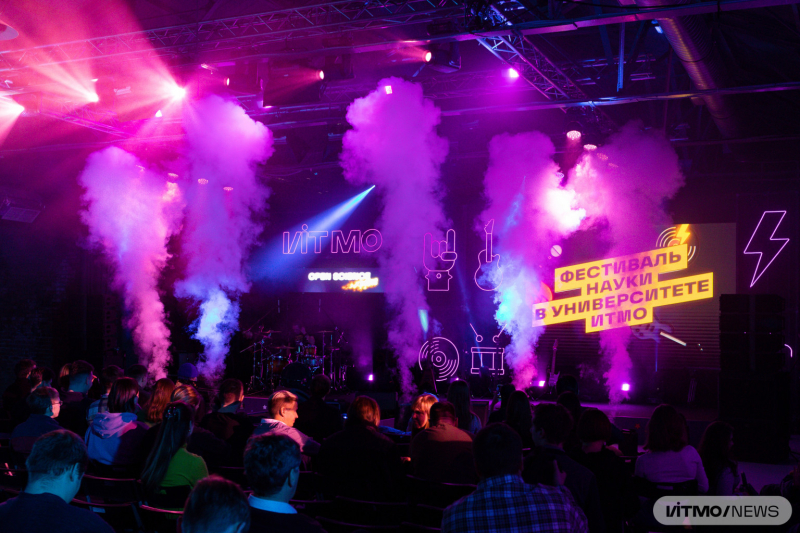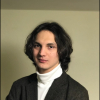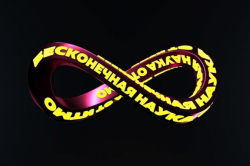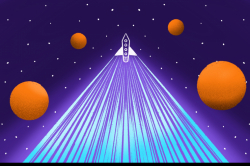It was another gray, damp morning outside, but inside the UKT space at Sevkabel Port it was about to get hot. Earlier used to store cable drums, UKT is now one of St. Pete’s trendiest venues for music festivals and scientific conferences. That day, the spacious area featured a lounge with tables and benches for early arrivals and a stage all set up for the show.
Heavy Metal: scientific geniuses present
The headliner of the event was Alexander Pushnoy, a showman, one-man band, physicist, and the original host of the legendary Russian TV science show Galileo, who opened the conference with an encouraging speech:
“It’s not only about being curious about the world around you and brainstorming ideas but also about making these ideas happen. And I’m happy to see that this is exactly what you do at ITMO: you create, invent, and produce life-changing products together with your industrial partners.”
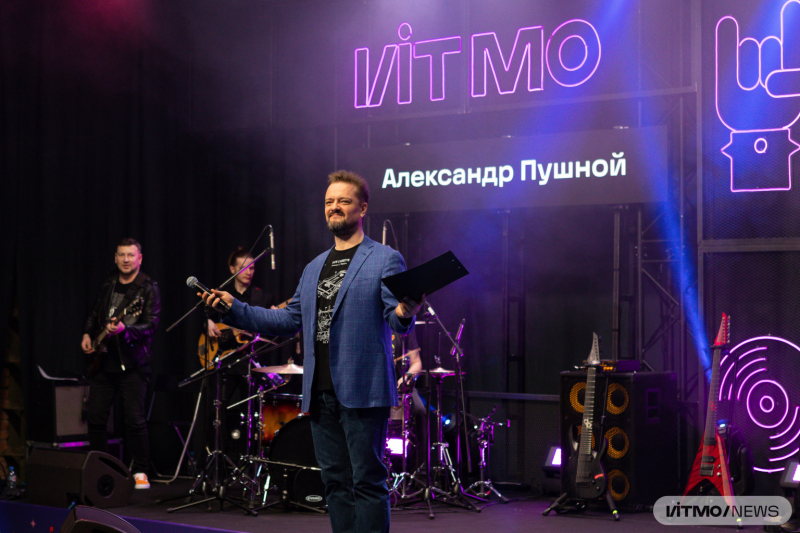
Alexander Pushnoy at ITMO Open Science Rocks in St. Petersburg. Photo by Dmitry Grigoryev / ITMO.NEWS
The shared theme of all of the sections of ITMO Open Science Rocks was that of turning ideas into products. The first section, named Heavy Metal, featured researchers’ pitches for their fundamental and applied studies. Thus, Maxim Gorlach, PhD, a senior researcher at ITMO’s School of Physics and Engineering, shed light on that part of the universe that, though unseen, surrounds us everywhere. Dark matter makes up a quarter of our universe – but we still can’t see or feel it. To make it less mysterious, researchers are on the search for its particles, seeing great potential in axions, which long couldn’t be detected with existing tools.
Nevertheless, scientists from ITMO University together with Frank Wilczek, a Nobel laureate in Physics, appeared to have come up with an answer – metamaterials. And who knows, perhaps a Nobel Prize is just around the corner?
Read also:
TV Host Alexander Pushnoy on Scientific Experiments, AI Dangers, and Science Popularization
Then, fundamental studies were followed by applied projects. Anton Kovalev, PhD, an associate professor at ITMO’s Institute of Advanced Data Transfer Systems, pitched the idea of swapping electronic devices for laser neurons when developing AI hardware. The scientist is confident that the future of data transfer and computing belongs to optics, with electronics being rather energy-demanding and reaching their threshold. In his report, the professor proposes not emulating a brain as an electronic AI does but rather creating a replica. Just like brain neurons, neuromorphic systems demonstrate an excitability threshold. They can take in signals from several sources, work asynchronously, and produce a vast array of signals, not just 0 and 1. At the same time, such systems can process information a million times faster than the human brain. The first-ever neurons of this kind are already being developed by researchers from ITMO and their colleagues from Tyndall National Institute and Munster Technological University (Ireland).
The rise of neural networks, on the other hand, has many expressing concerns that are not as far-fetched as they may sound. The thing is, neural networks are a “black box” in the sense that they contain pockets of self-trained algorithms that remain unknown to anyone rather than the system itself. Alexander Kugaevskikh, PhD, an associate professor at ITMO’s Faculty of Software Engineering and Computer Systems, explained how to turn this black box into a gray or even white one. All you need to do is to tackle the issue of under- and overtraining of neural networks – without summoning a demon, as the professor himself jokes.
Even more of applied nature is a project by Natalia Eremeeva, PhD, an associate professor and researcher at ITMO’s Faculty of Biotechnologies. Audience members, hooked by “grasshopper protein” and “printed calamari” in the title of the report, were assured by the researcher – we won’t be eating protein mush, The Matrix-style, anytime soon. In her presentation, the professor describes the challenges faced by FoodTech companies and existing solutions, including the use of insects as an alternative protein source. Unlike with animals, insect protein contains no allergens, is easily digestible, and, more importantly, much simpler and less costly to produce. As for the taste… researchers have something in mind. As noted by Natalia, specialists have invented taste receptor blockers that are already being used to reduce salt, sugar, and spice levels in ready-made products.
“When I got the invitation, I didn’t have to think for long. Events like this are very needed and important: this is where we learn what our colleagues, either those next door or anywhere on the planet, do and adopt their practices for our own projects. The audience, in its turn, learns the world doesn’t stand still,” comments Natalia Eremeeva. “The one-of-its-kind format helps them relax: everyone wants to have a good time, with no feeling that someone is constantly evaluating them. Besides, researchers aren’t stuck-up suits, they are just like everyone else.”
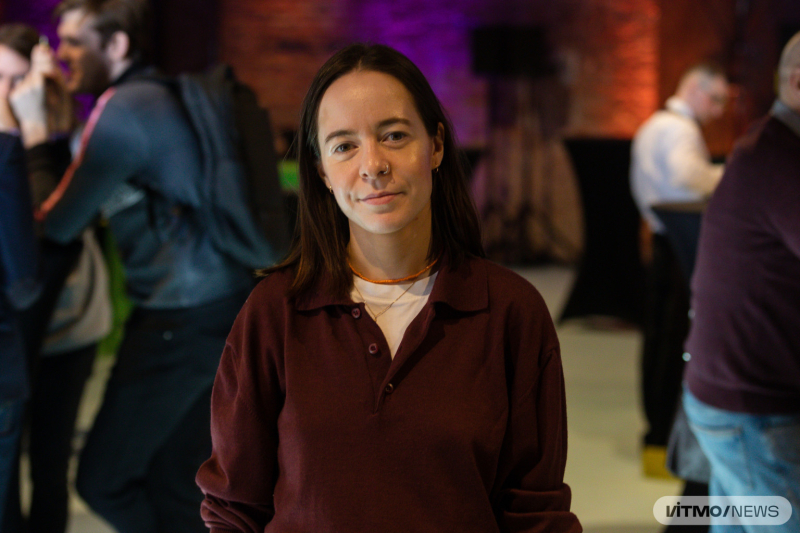
Natalia Eremeeva. Photo by Dmitry Grigoryev / ITMO.NEWS
Read also:
ITMO Scientists Develop Ultracompact Optical Switch
ITMO Scientists Suggest Way to Control Optical Properties of Novel 2D Materials in Low Temperatures
Garage Band: lobbies, posters, and casual convo
In between two major blocks, participants could enjoy a poster session, which added up to the overall style of the conference with its digital screens instead of paper posters and exhibits that they could be touched and seen in action.
During a coffee break, everyone had a chance to chat with each other in a relaxed atmosphere. As the conference had already been held before, it was no surprise that such networking opportunities can produce fruitful results:
“To begin with, I’m a huge fan of the concept behind the event. It closes the Congress of Young Scientists, and what can be a better way to release some steam after a series of scientific conferences than a rock concert?” notes Dmitry Bykov, an admission manager at ITMO’s School of Physics and Engineering. “ITMO Open Science Rocks is a wonderful place to get to know what your colleagues are working on. Since my job is to promote the university’s educational programs, I need to be in the loop about what’s going on in today’s physics so that I can share it with our prospective students. For example, last year, my colleagues and I came up with an idea for a video series that would describe our major fields in detail – now, you can easily find them on YouTube.”
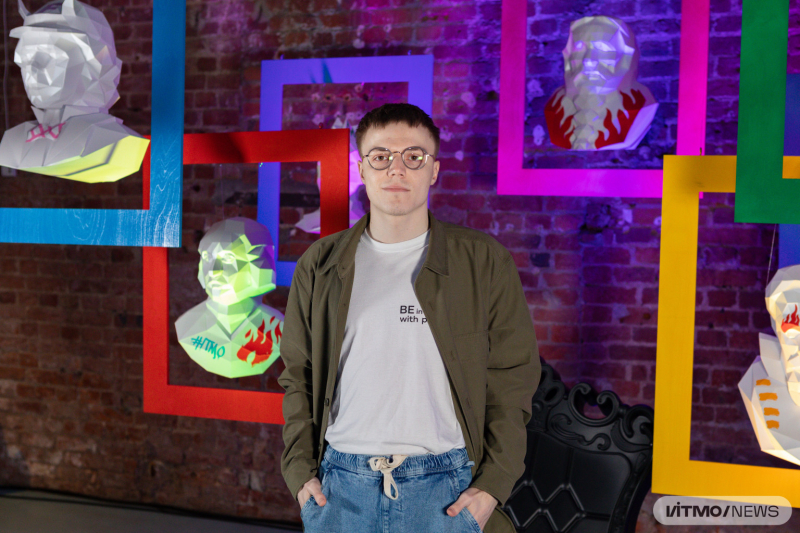
Dmitry Bykov. Photo by Dmitry Grigoryev / ITMO.NEWS
Guitar Solo: short presentations on relevant issues
But this was just the beginning. What followed were more than ten presentations on how ITMO is contributing to research in some of the most topical scientific fields.
Everyone knows that neural networks and artificial intelligence are all the rage in IT nowadays (ChatGPT deserves a special mention). In addition to other projects, ITMO scientists managed to create neural networks capable of making other neural networks. According to Nikolay Nikitin, the head of research and technological development at the Research Center “Strong AI in Industry,” it was made possible via the use of evolutionary algorithms, which are computations that utilize a process inspired by biological natural selection. One of the prototypes created with this method is the open-source framework FEDOT, capable of automated machine learning.
Following on the topic of IT, robotics-based projects took the stage. For example, Vladislav Gromov, an associate professor at the Faculty of Control Systems and Robotics, spoke about ITMO-made walking robots capable of using their sensors to not only see, but also recognize what it is they are looking at. Manufacturing companies could potentially use them to collect data in hazardous or remote environments.
Another segment was dedicated to product safety, both from physical threats as well as forgery. Dmitry Zuev, a senior research associate at the Faculty of Physics, suggested using silicon nanoparticles to manufacture unclonable anti-counterfeiting labels, each with a unique arrangement of particles. Meanwhile, Galina Odintsova, a senior research associate at the Institute of Laser Technologies, is developing a different solution together with her colleagues. She proposes utilizing lasers to engrave metal surfaces with one-of-a-kind patterns.
The Faculty of Biotechnologies is also working on the frontiers of science, as evidenced by its PhD students Ivan Shmelev and Nikita Tyutkov. The former proposed cultivating microorganisms such as yeast for their proteins as an alternative to insects. The latter presented his idea of adding probiotics to ice cream. Probiotics are bacteria that live inside the human digestive tract while providing health benefits.
The closing presentation was delivered by Anna Lavrova, an employee of the Center of Usability and Mixed Reality. Instead of a simple report, she wrote and performed a song about her work: a computer game teaching kids healthy eating habits. The game was designed by the scientists from ITMO and Universiti Brunei Darussalam.
Read also:
The Future of AI: ITMO Scientists Present Cutting-Edge Projects
How Biomimetics Helps Scientists Create Materials With New Properties
Industrial Battle: when science and industry team up
During the Industrial Battle segment of the conference, ITMO scientists teamed up with industry specialists to speak about the developments of various proprietary technologies. Partnerships like these are incredibly important, since private companies often lack talented researchers while having access to cutting edge equipment and unique resources. Meanwhile, universities have plenty of ideas and designs but no opportunities to monetize those ideas.
This year at Industrial Battle, researchers presented smart electric drives (the Faculty of Control Systems and Robotics together with Diakont JSC), customer-centric AI (the Research Center “Strong AI in Industry” together with Bank St. Petersburg), a wireless electric car charger (the Faculty of Physics and the company Yablochkov), and quantum amplifiers for the Polar Express submarine fiber-optic communication line connecting Murmansk and Vladivostok (the Research Institute of Light-Guided Photonics and the Perspective Technologies Agency).
“I was invited to this festival by an acquaintance who works at ITMO. To be frank, I’m awed by how well this event was organized. I sometimes attend popular science events and I believe that truly wise people are always capable of presenting their work in a clear and accessible manner. In this case, it is apparent that the speakers have gone out of their way to make their research sound as interesting as possible, though it was not always fully digestible. The rock frenzy acted as extra sauce on top of the main course (the scientific projects). Now, you can eat your meal as is, but the sauce makes it a lot tastier. That is why I will attend next year’s festival even if the theme changes. I will even bring my kids along so they can see what is happening in science from a new angle,” said Sergei, an engineer from Novosibirsk who attended the festival.
Guitar Solo TOP Freshman: giving the floor to the young
ITMO Open Science Rocks welcomes everyone, from experienced researchers and representatives of major companies to those who are just starting their scientific careers. The Guitar Solo TOP Freshman segment was designed specifically with young scientists in mind. Participants of the Congress of Young Scientists – an annual scientific conference where students compete for a chance to enroll in ITMO University’s Master’s programs without the need to take entrance exams – were encouraged to submit their applications in the form of video pitches.
The pitches in question were every bit as impressive as those from experienced scientists. The fields that were covered included STEM, natural sciences, IT, and even law.
For example, Arina Pavlova, a second-year Bachelor’s student studying chemical engineering at the Infochemistry Scientific Center, discovered how to improve chemical tests by applying gold film. In essence, gold nanoparticles are capable of strengthening the signals used in Raman spectroscopy, which is a prominent investigative method in forensics, ecology, and medical diagnostics.
Alina Luzanova, another student of the Infochemistry Scientific Center and a participant of the ITMO.Collab project, showcased how algorithms can assist chemists in their work. Seeing how a lion’s share of any researcher’s time is spent reading scientific articles, Alina and her team decided to develop an app that would automatically compile a database of chemical reactions and their parameters from a set of papers. This would make it so scientists can find the necessary information in just a couple of clicks.
Read also:
Congress of Young Scientists 2022: Participants Share Their Experience
There were also participants from other universities. For instance, Elizaveta Ishutina, a fourth-year student in power engineering and automation of ships at St. Petersburg State Marine Technical University, offered a SQL-based system as a solution to the ever-rising threat to consumer data.
“I’m here to present a project on a chemical search engine that we’re working on at ITMO’s Infochemistry Scientific Center for the Priority 2030 program. It was first an idea of Ekaterina Skorb, but now we have a full-fledged team of chemists and programmers. As of now, it’s only in the prototype stage, but we’re already negotiating a partnership with the platform Sintelli, which specializes in parsing of chemical papers. Our goal is to build an open-source mobile and web application that would be an excellent alternative to those platforms that require a specialized license and thus are used only at a few universities in Russia,” shares Alina Luzanova, the winner of Guitar Solo TOP Freshman.
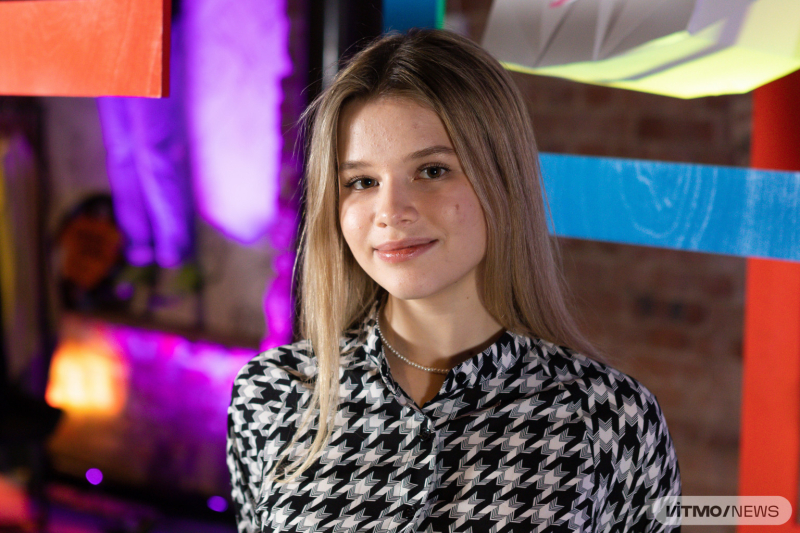
Alina Luzanova. Photo by Dmitry Grigoryev / ITMO.NEWS
What to expect next
The conference ended with a live performance by Alexander Pushnoy that got the crowd – students, participants, and scientists – moving. Although ITMO Open Science Rocks 2023 came to an end, the next one is right on the horizon.
“This year’s conference delighted us with even more formats, topics, and fundamental studies; we also categorized all the products and projects in each section based on their life cycle stages, be it an idea, prototype, or MVP. We can’t yet tell what the next event will be like, but if you have any wishes, please write to us at event@itmo.ru,” concludes Maria Yakovleva, the event’s organizer.
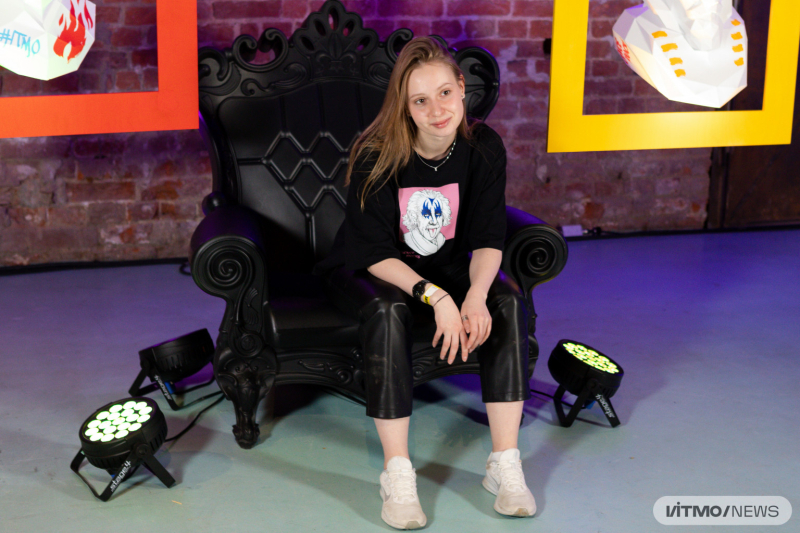
Maria Yakovleva. Photo by Dmitry Grigoryev / ITMO.NEWS
You can watch a full livestream of the conference here.
